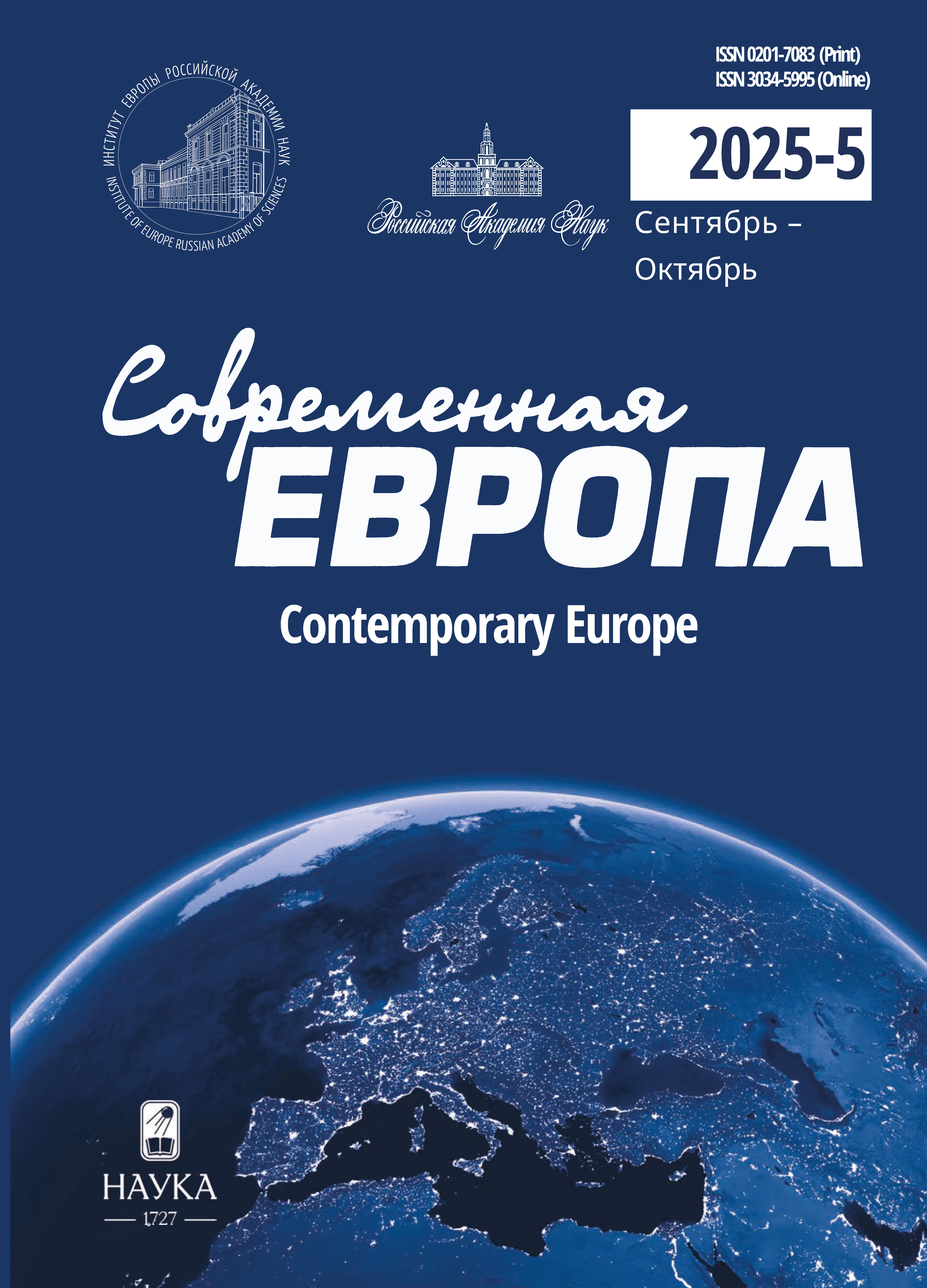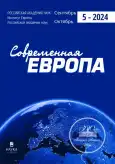The Britain’s Influence in the Post-Soviet Space: Socio-Humanitarian Aspect
- Authors: Sutyrin V.V1,2
-
Affiliations:
- Institute for International Studies, MGIMO University
- State Academic University for Humanities
- Issue: No 5 (126) (2024)
- Pages: 112-125
- Section: EUROPEAN PROCESS: COUNTRIES AND REGIONS
- URL: https://rjsvd.com/0201-7083/article/view/652319
- DOI: https://doi.org/10.31857/S0201708324050097
- ID: 652319
Cite item
Abstract
The paper is aimed at investigating the recent trends of Britain’s socio-cultural influence in the former USSR republics. The analysis covers London’s major regional programmes, financing, mechanisms of influence, and implementing organisations. Subregional differentiation of political approaches is established. In Ukraine and Moldova sociocultural in-fluence infrastructures are aimed at direct political influence as well as military and political struggle with Russia. In the South Caucasus London prioritises broadening influence in the interstate dialogue and conflicts as well as anti-Russian information campaigns with the aim of removing Russian military presence. In Central Asia Britain works on broadening regional footprint through technical and socio-economic programmes. The author concludes that preservation of limitrophe status of the former USSR republics constitutes merely one possible mode of British regional policy. The other mode consists of regional order revision which presupposes transition from strengthening a neutral status of post-Soviet states towards instrumentalising their dependencies on Britain’s influence in the ongoing geopolitical contest with Russia. In the face of transition to a polycentric world order Britain’s development assistance and influence programmes evolved in the direction of politicisation and weaponisation. Hence destabilisation risks for post-Soviet states increase. In the context of a “unipolar moment” London was interested in the development of post-Soviet space as a part of global periphery of the Western-centric international system, but not as a part of an alternative geoeconomic pole. Amid the transition to a polycentric world order British system of influence is increasingly coming into conflict with alternative poles hence proliferating destabilisation risks for the former USSR republics.
About the authors
V. V Sutyrin
Institute for International Studies, MGIMO University; State Academic University for Humanities
Email: v.sutyrin@inno.mgimo.ru
Candidate of Sciences (Political), Director, Center of Science Diplomacy and Advanced Academic Initiatives; Associate Prof., Moscow, Russia; Moscow, Russia
References
- Алексеева А.В. (2018) Роль Организации развития Ага Хана в постконфликтном восстановлении Таджикистана. Пути к миру и безопасности. № 1. С. 308‒323.
- Alekseeva A.V. (2018) Rol' Organizacii razvitija Aga Hana v postkonfliktnom vosstanovlenii Tadzhikistana [The role of Aga Khan Development Network in Tajikistan’s postconflict development], Puti k miru i bezopasnosti, 1, pp. 308‒323. (In Russian).
- Ананьева Е.В. (2022) Британия: новые премьеры, новый монарх через призму политической культуры. Современная Европа. № 6. С. 35‒50.
- Ananieva E.V. (2022) Britanija: novye prem'ery, novyj monarh cherez prizmu politicheskoj kul'tury [The UK: New Prime Ministers, a New Monarch Through the Prism of Political Culture], Sovremennaya Evropa, 6, pp. 35‒50. (In Russian).
- Ананьева Е.В., Охошин О.В. (отв. ред.) (2023) Британия-2022: смена премьеров, смена монарха. Ин-т Европы РАН, Москва. 194 с.
- Ananieva E.V., Okhoshin O.V. (ed.) (2023) Britaniya-2022: smena prem'erov, smena monarha [The UK-2022: Change of Prime Ministers, Change of Monarch], In-t Evropy RAN, Moscow, Russia. (In Russian).
- Годованюк К.А. (2021) Британо-турецкие отношения в свете брекзита. Научно-аналитический вестник Института Европы РАН. № 1. С. 24‒31.
- Godovanjuk K.A. (2021) Britano-tureckie otnoshenija v svete brekzita [UK-Turkey Relationship in Light of Brexit], Nauchno-analiticheskij vestnik IE RAN, 1, pp. 24‒31. (In Russian).
- Годованюк К.А. (отв. ред.) (2021) Британия после брекзита. Ин-т Европы РАН, Москва. 184 с.
- Godovanjuk K.A. (ed.) (2021) Britaniya posle brekzita [Britain After Brexit], In-t Evropy RAN, Moscow, Russia. (In Russian).
- Гончаренко А.Р. (2022) Неправительственные организации как акторы современной гибридной войны: деятельность западных НПО в Центральной Азии. Гражданин. Выборы. Власть. № 4. С. 129‒144.
- Goncharenko A.R. (2022) Nepravitel'stvennye organizacii kak aktory sovremennoj gibridnoj vojny: dejatel'nost' zapadnyh NPO v Central'noj Azii. Grazhdanin. Vybory. Vlast', 4. pp. 129‒144. (In Russian).
- Громыко Ал.А. (2023) Введение. Европа в глобальной пересборке. Под общ. ред. Ал.А. Громыко. Весь мир, Москва. С. 8–12.
- Gromyko Al.A. (2023) Vvedenie [Introduction], in Gromyko Al.A. (ed.) Evropa v global'noj peresborke, Ves' mir, Moscow, Russia. (In Russian).
- Когут В. Г., Нурышев Г. Н. (2021) Карабахский узел геополитических противоречий на Южном Кавказе. Евразийская интеграция: экономика, право, политика. № 1. С. 104‒111.
- Kogut V.G., Nuryshev G.N. (2021) Karabahskij uzel geopoliticheskih protivorechij na Juzhnom Kavkaze [Karabakh Knot of Geopolitical Contradictions in the South Caucasus], Evrazijskaya integraciya: jekonomika, pravo, politika, 1, pp. 104‒111. (In Russian).
- Сутырин В.В. (2022) Политика Евросоюза в сфере содействия международному развитию на постсоветском пространстве: геополитические факторы. Современная Европа, № 5. С. 5‒18.
- Sutyrin V.V. (2022) Politika Evrosojuza v sfere sodejstvija mezhdunarodnomu razvitiju na postsovetskom prostranstve: geopoliticheskie faktory [EU Policy in the Area of Official Development Assistance in the Post-Soviet Space: Geopolitical Factors], Sovremennaya Evropa, 5, pp. 5‒18. (In Russian).
- Харитонова Е.М. (2018) «Мягкая сила» Великобритании. ИМЭМО РАН, Москва. 139 с.
- Haritonova E.M. (2018) «Mjagkaja sila» Velikobritanii [Britain's Soft Power], IMEMO RAN, Moscow, Russia. (In Russian).
- Энтина Е.Г. (отв. ред.) (2023) «Мягкая сила» в Черноморско-Средиземноморском регионе. Ин-т Европы РАН, Москва. 194 с.
- Энтина Е.Г., Давранова С.Б., Мелоян Т.Х., Наджаров А.М. (2023) Военно-политическое присутствие Великобритании на Южном Кавказе. Изд. дом Высшей школы экономики, Москва. 26 с. URL: https://wp.hse.ru/data/2023/09/14/2058296379/WP21_2023_04_____.pdf (дата обращения: 10.03.2024).
- Entina E.G. (ed.) (2023) “Mjagkaja sila” v Chernomorsko-Sredizemnomorskom regione [Soft Power in the Black Sea – Mediterranean region], In-t Evropy RAN, Moscow, Russia. (In Russian).
- Allan D., Bond I. (2022) A new Russia policy for post-Brexit Britain. The UK must abandon its delusions to deal effectively with Russia. Chatham House, London, UK. 33 p. (13.04.2022 The Royal Institute of International Affairs (Chatham House) внесен в Перечень иностранных и международных неправительственных организаций, деятельность которых признана нежелательной на территории РФ).
- Banks N., Brockington D. (2020) Growth and change in Britain’s development NGO sector (2009–2015). Development in Practice. Vol. 30. No. 6. P. 706‒721.
- Lanoszka A., Rogers J. (2022) “Global Britain” and the Black Sea region. Council on Geostrategy Policy Paper. No. SBIPP07. 40 p.
- Laruelle M., Rivera E. (2019) Imagined Geographies of Central and Eastern Europe: The Concept of Intermarium. Institute for European, Russia, and Eurasian Studies. IERES Occasional Papers. The George Washington University, Washington, USA. 28 p.
- Pamment J. (2018) British Public Diplomacy and Soft Power Diplomatic Influence and the Digital Revolution. Springer International Publishing, London, UK. 247 p.
- Snow N., Cull N. (ed.) (2020) Routledge Handbook of Public Diplomacy. Routledge, London, UK. 528 p.
Supplementary files











